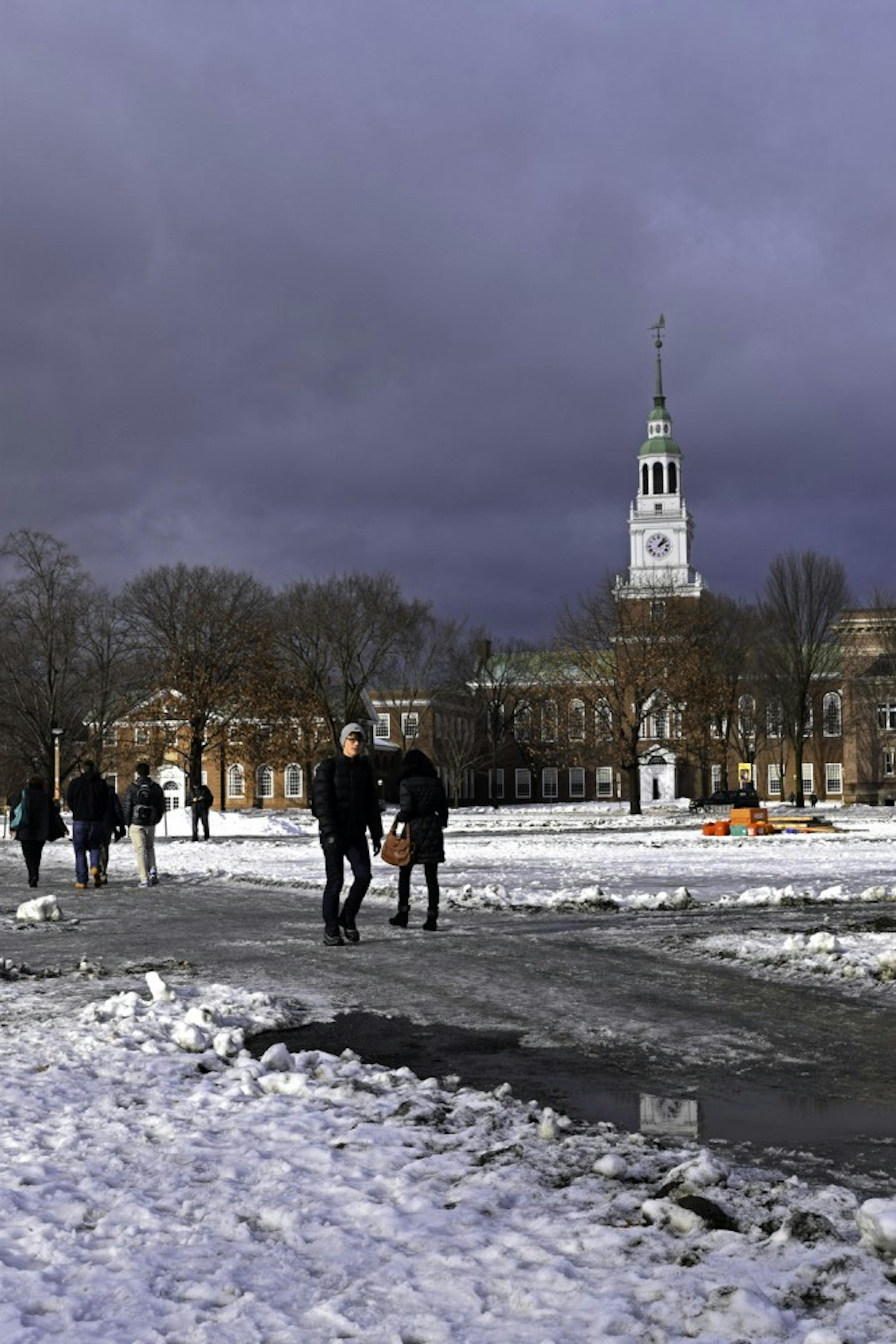Hanover has been “battling the snow and ice” this winter, town manager Julia Griffin said, as rising road salt prices across the U.S. are adversely affecting Hanover and Dartmouth.
This past weekend, melting snow and freezing rain turned roads and sidewalks slippery. Associate vice president of Facilities, Operations and Management Frank Roberts sent out a campus-wide email late Monday afternoon warning of dangerous conditions around campus, attributing the problem to puddles that cannot drain completely due to the snow banks on both sides of sidewalks and roads. The water then refreezes when temperatures drop. He advised students and faculty to wear appropriate footwear and take care when walking around campus. Roberts did not respond to multiple requests for comment by press time.
FO&M spent the weekend removing snow and ice and treating sidewalks with salt and sand mixtures, and is set to continue the process today. Representatives of FO&M did not respond to requests for comment by press time.
Hanover has been spending more money on sand and salt than it would like, Griffin said. Because demand for salt is higher this year, prices are also higher, she said. Following harsh snowstorms last winter in cities across the country, domestic road salt prices have skyrocketed.
For the fiscal year 2015, Hanover budgeted $164,600 for 2,400 tons of salt, $44,500 for 4,500 tons of sand and $20,790 for 99,000 pounds of Landscaper’s Choice, Kublacki said.
Office manager at Barrett Trucking Co. Inc. — a Burlington, Vermont-based company that distributes road salt to Dartmouth — Tim Barrett said that the total salt stockpiles do not usually change from year to year, so prices are directly influenced by demand resulting from the previous year’s weather. Dartmouth specifically has been paying 10 percent more than it did last year for salt, he said, adding that salt prices are usually volatile.
Last year, all regions of the country experienced harsh winter weather, depleting all salt stockpiles, Barrett said.
Pricing is controlled by the state of New Hampshire, which allows companies to bid on a yearly price for the salt supply, he said. Road salt is mined in Lansing, New York, brought into White River Junction by rail and then trucked to Dartmouth. Towns have been taking money out of their budgets for next year to ensure they have enough to pay for salt this winter, he said.
“A lot of them are screaming and hooting and hollering because of the price increase, but you just have to adjust your budget,” he said.
Once Hanover goes over budget, the town will need to consider other measures, including increased plowing and increased use of sand on paved roads, Kublacki said.
Though salt prices have risen, this has not caused towns and other commercial customers to purchase less, Barrett noted.
“It’s one of those products that you can’t not buy,” Barrett said. “The only time you can avoid buying it is if you don’t get any bad weather.”
The alternative to using pure road salt, Barrett said, is using a mixture of sand and salt. Though that option is cheaper at first, the maintenance cost of cleaning up the sand once the snow melts ends up costing the town just as much money. The salt and sand mixture comes from local quarries in Vermont and New Hampshire.
Director of Safety and Security Harry Kinne said in an email that there have only been a couple of reports of ice-related incidents this season — one was damage to a vehicle due to ice falling from a roof, and the other a fall at Occom Pond. The Upper Valley has experienced many motor vehicle accidents related to the severe weather, but none directly involving the campus or Dartmouth community members, Kinne said.
He also speculated that the decreased number of injuries on campus so far this season is due to the general lack of snow and ice, the fact that Occom Pond only just opened due to warmer weather last December and the fact that sledding at the golf course has been less popular due to a lack of snow.
“Winter is still a long way from being over, so that may change,” Kinne said.
Last year, Kinne told The Dartmouth that Safety and Security had witnessed a jump in ice-related injuries.




